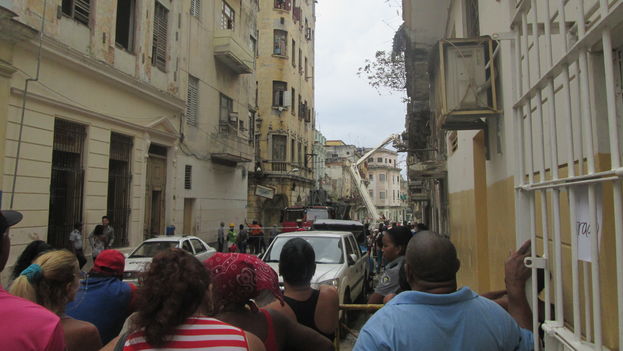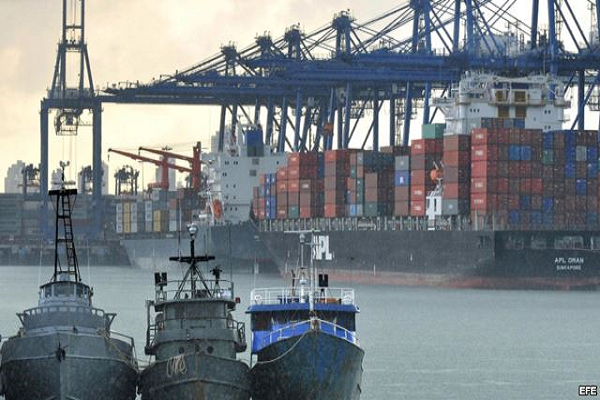Denouncing democrats new role in supporting the spread of communism, islam and intent in destroying the american way of life.
LET'S FIGHT BACK

GOD BLESS AMERICA
Sunday, April 30, 2017
Peru,Thank You for Your Example and Great Strength / Somos+
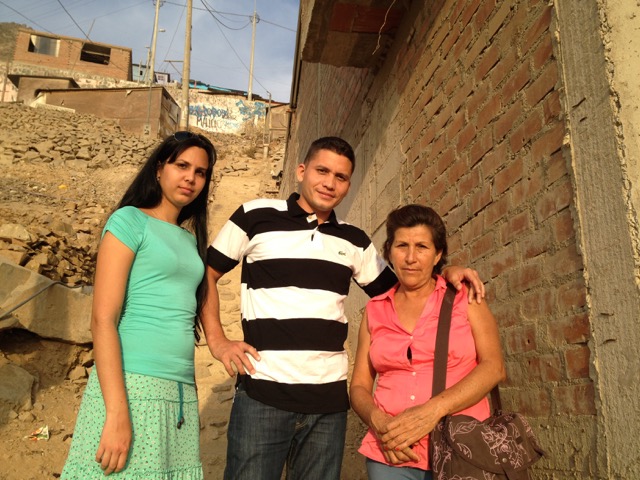
Somos+, Eliecer Avila, Havana, 21 March 2017 — During those days we observed with deep sorrow the disaster that Peruvians are enduring, with many deaths and thousands homeless due to flooding and landslides. A beautiful country that has overcome some of the most unfavourable historical events, to rise up to one of the continent’s and the world’s emerging economies of our time.
It has reached a stable democracy after more than a decade of civil war, dictatorship, and extreme poverty. It has since started to forge a modern history of sustained growth, advances in social issues, in infrastructure, in telecommunications, with booming business and an unprecedented right-wing state.
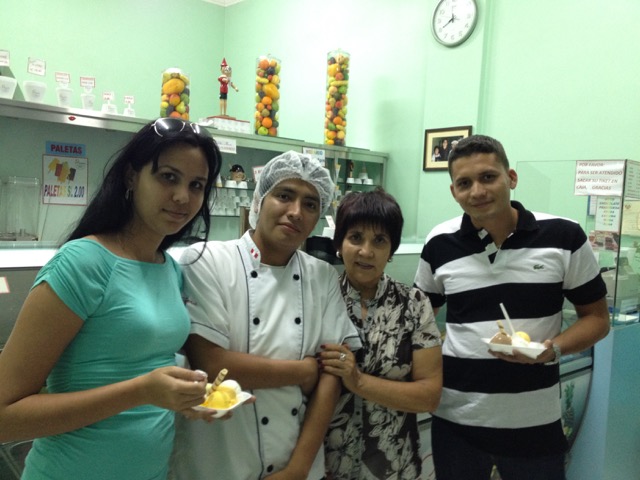
Still far away from its potential, Peru today constitutes an example of what a Latin American nation can achieve when it advances together and is reconciled in what is necessary. One can appreciate the tremendous efforts of its entire diaspora that has not rested, collecting assistance that will soon reach the hands of their compatriots to alleviate, even if just a little, so much shared pain.
Our movement maintains strong ties of solidarity and cooperation with different institutes and civil organizations in Peru. We have witnessed there the humility, education and immense spirit of work that distinguishes its people. To all our friends, we want to let you know that we are at your disposal to help in everything that is possible.
We are sure that this dark chapter will pass and the immense South American nation will resume even more strongly its path of flourishing and progress. They will achieve it with the same spirit they express, in the motto that accompanies their shield and banner: “Steady and happy for the union.”
Reporters Without Borders Rates Press Freedom In Cuba Very Low
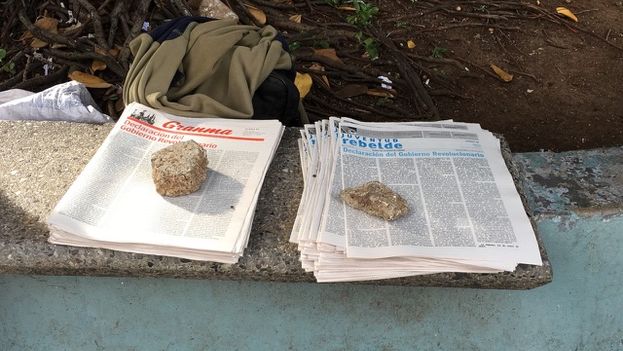
Cuba is the only country on the American continent and the Caribbean that is in this section of the index and is almost at the end of the list.
According to a note published by the NGO, the Cuban government “is the most hostile on the American continent to the freedom of the press,” emphasizing that the state maintains a monopoly on the press and that the situation “has not changed after the death of Fidel Castro.” continue reading
In addition, RSF has described the former Cuban leader, who died in November 2016, “as one of the greatest offenders again press freedom on the planet.”
This classification contrasts with the report of attacks on the press published Tuesday by the Committee for the Protection of Journalists (CPJ), according to which “Cuba’s media landscape has begun opening up in recent years,” thanks to a timid increase in Internet connectivity and a generation of journalists who are “who are critical of, yet still support, socialist ideas.”
The RSF publication shows how the Caribbean country shares positions at the bottom of the list with Egypt, Libya, Iran, Yemen, Syria, China and North Korea, countries in which, according to the note, the deterioration of press freedom is “very serious.”
In Latin American countries such as Venezuela, Mexico, Honduras, Guatemala and Colombia, the organization believes that the press is in “a difficult situation.”
North Korea ranks lowest on the list in terms of freedom of the press, according to the NGO, a country “which continues to be a Cold War dictatorship,” in which “listening to a radio station from outside the country may lead to a concentration camp.”
However, RSF notes that the quality of press freedom has declined globally, where the western democracies are no exception even though they occupy the top of the list
Since 2002 an international group of journalists has produced this list, where 180 countries have been listed, following a series of criteria such as the independence of the media in each nation, the legislation under which journalists work, and the pluralism and security of journalists in the performance of their profession.
Happiness / Somos+
Somos+, Roberto Camba, 21 March 2017 — The United Nations has just launched the 2017 World Happiness Report, coinciding with the World Happiness Day on March 20th. From its first publication in 2012, the world has come to understand more and more that happiness has to be used as the correct measure with regards to social progress and the objective of public policies.
The report is based on statistics collected from the happiness index or subjective well-being, Gross Domestic Product, social support, life expectancy from birth, freedom to make decisions, generosity, perception of corruption (within the government or in businesses), positive or negative feelings, confidence in the national government and in society, the level of democracy and the level of income per household. continue reading
Much of the data is taken from the average of the results of Gallup’s global survey. For example, the “life’s staircase” question: “imagine a staircase, with steps numbered from 0 (at the base) to 10 (at the top). The top of the stairs represents the best life possible for you and the base the worst life possible. Which step do you feel like you are currently at right now?”
“Social support” means having someone that you can rely on during times of difficulty. Generosity equates to having donated money to a charitable organisation over the past month. Whereas, positive or negative feeling relates to questions about whether for the most part of the previous day the individual experienced happiness, laughter or pleasure; or rather did they experience negative feelings such as worry, sadness or anger. The report references its sources and explains the other indexes which negatively influence the perception of happiness such as: unemployment or social inequality.
The 2017 Happiness Report places Norway at the top of its list, followed by: Denmark, Iceland, Switzerland, Finland, the Netherlands, Canada, New Zealand, Australia, and Sweden as the top ten.
The US was listed at number 14 and Spain at 34. The best placed Latin American nations were Chile (20), Brazil (22), Argentina (24), Mexico (25), Uruguay (28), Guatemala (29) and Panama (30). The list included 155 countries. Those that have improved the most with regards to their position between 2005-2007 are Nicaragua, Lithuania and Sierra Leone, whilst Venezuela is the country that has slipped down the rankings the most.
And Cuba? It does not appear on the list. The Network of Solutions for Sustainable Development that prepared the report only possesses data on Cuba from 2006. During that time, the average response to the “staircase of life” was 5.4 (which placed it at 69th out of 156 nations), just behind Kosovo. Possibly today many Cubans would answer “where is the staircase to even begin to climb it?”
According to the 2006 data, Cuba appeared to be high in its ranking of social support and life expectancy from birth, but it was the third worst in freedom to make decisions. It was ranked as low for level of democracy, despite the fact that its per capita GDP surpassed China, Mexico, Brazil and South Africa to name some of the prosperous economies in the world*. In the net index of feelings (the average of positive feelings subtracted by the average of negative feelings) Cuba occupied the 112th place, making it the lowest ranked country in Latin America, with only Haiti having worse figures.
This index is the most direct measurement of fulfillment or of personal frustration that influences values and behaviour.
Of course beyond scientific rigour, no statistic or survey is 100% reliable. Subjective happiness or individual perception of happiness is very variable. Replying to these questions implies making a mental comparison. We compare ourselves to our neighbour, to those abroad, to our past or to our previous situation.
who receive manipulated information will not be able to effectively compare themselves. Furthermore, people think as they live: having access to running water could be the ultimate happiness for someone living in Sub-Saharan Africa, but a European or North American considers that they must have that and would take offense if they did not have it.
Cubans do not need a global report to know that there is a low happiness index among the people. The problems seem insoluble, the shortages are growing, personal ambitions have had to be postponed for decades, emigration becomes the only hope. The government quashes individual initiatives and working towards the happiness of its people — or allowing others to do it — does not seem to be in its projections. At Somos Más (We Are More) we believe that a responsible government must have this as its main objective and we will continue to fight to achieve it.
Translator’s note: If the GDP used for this analysis was that provided by the Cuban government, it would likely have been inaccurate.
Friday, April 28, 2017
Corruption Versus Liberty: A Cuban Dilemma / Dimas Castellano
Dimas Castellanos, 18 November 2016 — The evil of corruption–the act of corruption and its effects–has accompanied the human species since its emergence. It has been present in all societies and in all ages. Its diverse causes range from personal conduct to the political-economic system of each country. In Cuba it appeared in the colonial era, it remained in the Republic, and became generalized until becoming the predominant behavior in society.
To understand the regression suffered we must return to the formation of our morality, essentially during the mixing of Hispanic and African cultures and the turning towards totalitarianism after 1959, as can be seen in the following lines.
The conversion of the island into the world’s first sugar and coffee power created many contradictions between slaves and slave owners, blacks and whites, producers and merchants, Spanish-born and Creole, and between them and the metropolis. From these contradictions came three moral aspects: the utilitarian, the civic and that of survival. continue reading
Utilitarian morality
The father of utilitarianism, Jeremy Bentham (1748-1832), said that utility is measured by the consequences that actions tend to produce, and came to the conclusion that all action is socially good when it tries to procure the greatest possible degree of happiness for the greatest number of people, and that each person has the right to be taken into account in the exercise of power.
That thesis of Bentham became a popular slogan synthesized in the phrase: “The greatest happiness for the greatest number.” Such a concept crystallized in Cuba as a creole variant of a utilitarianism that took shape in exploitation, smuggling, corruption, banditry, and criminality, which turned into the violation of everything predisposed as an accepted norm of conduct in society.
The gift of a plant by the sugar planters to the governor Don Luis de las Casas; the diversion of funds for the construction of Fortaleza de la Real Fuerza de la Cabaña, which made it the most expensive fortress in the world; the gambling house and the cockfighting ring that the governor Francisco Dionisio Vives had for his recreation in the Castillo de la Real Fuerza, whose government was known for “the three d’s”: dancing, decks of cards, and drinking, for which reason, at the end of his rule, there appeared a lampoon that said: “If you live (vives) like Vives, you will live!”; the mangrove groves; bandits like Caniquí, the black man of Trinidad and Juan Fernandez, the blond of Port-au-Prince … are some examples.
Utilitarianism reappeared on the republican scene as a discourse of a political, economic, and military elite lacking in democratic culture, swollen with personalismo, caudillismo, corruption, violence and ignorance of anything different. A masterful portrait of this morality was drawn by Carlos Loveira in his novel Generales y doctores, a side that resurfaced in the second half of the twentieth century.
Thus emerged the Republic, built on the symbiosis of planters and politicians linked to foreign interests, with a weak civil society and with unresolved, deep-rooted problems, as they were the concentration of agrarian property and the exclusion of black people. The coexistence of different moral behaviors in the same social environment led to the symbiosis of their features. Utilitarianism crisscrossed with virtues and altruisms, concerns and activities on matters more transcendent than boxes of sugar and sacks of coffee.
Throughout the twentieth century, these and other factors were present in the Protest of the 13, in the Revolution of the 30, in the repeal of the Platt Amendment, in the Constituent Assembly of 1939, and in the Constitution of 1940. Also in the corruption which prevailed during the authentic governments and in the improvement accomplished by the Orthodox Dissent and the Society of Friends of the Republic. Likewise, in the 1952 coup d’etat and in the Moncada attempted counter-coup, in the civic and armed struggle that triumphed in 1959 and in those who since then and until now struggle for the restoration of human rights.
Civic morality
Civic morality, the cradle of ethical values, was a manifestation of minorities, shaped by figures ranging from Bishop Espada, through Jose Agustín Caballero to the teachings of Father Felix Varela and the republic “With all and for the good of all” of José Martí. This civic aspect became the foundation of the nation and source of Cuban identity. It included concern for the destinies of the local land, the country, and the nation. It was forged in institutions such as the Seminary of San Carlos, El Salvador College, in Our Lady of the Desamparados, and contributed to the promotion of the independence proclamations of the second half of the nineteenth century, as well as the projects of nation and republic.
Father Félix Varela understood that civic formation was a premise for achieving independence and, consequently, chose education as a path to liberation. In 1821, when he inaugurated the Constitutional Chair at the Seminary of San Carlos, he described it as “a chair of freedom, of human rights, of national guarantees … a source of civic virtues, the basis of the great edifice of our happiness, the one that has for the first time reconciled for us the law with philosophy.”
José de la Luz y Caballero came to the conclusion that “before the revolution and independence, there was education.” Men, rather than academics, he said, is the necessity of the age. And Jose Marti began with a critical study of the errors of the War of 1868 that revealed negative factors such as immediacy, caudillismo, and selfishness, closely related to weak civic formation.
This work was continued by several generations of Cuban educators and thinkers until the first half of the twentieth century. Despite these efforts, a general civic behavior was not achieved. We can find proof of this affirmation in texts like the Journal of the soldier, by Fermín Valdés Domínguez, and the Public Life of Martín Morúa Delgado, by Rufino Perez Landa.
During the Republic, the civic aspect was taken up by minorities. However, in the second half of the twentieth century their supposed heirs, once in power, slipped into totalitarianism, reducing the Western base of our institutions to the minimum expression, and with it the discourse and practice of respect for human rights.
Survival morality
Survival morality emerged from continued frustrations, exclusions, and the high price paid for freedom, opportunities, and participation. In the Colony it had its manifestations in the running away and insurrections of slaves and poor peasants. During the second half of the twentieth century it took shape in the lack of interest in work, one of whose expressions is the popular phrase: “Here there is nothing to die for.”
It manifested itself in the simulation of tasks that were not actually performed, as well as in the search for alternative ways to survive. Today’s Cuban, reduced to survival, does not respond with heroism but with concrete and immediate actions to survive. And this is manifested throughout the national territory, in management positions, and in all productive activities or services.
It is present in the clandestine sale of medicines, in the loss of packages sent by mail, in the passing of students in exchange for money, in falsification of documents, in neglect of the sick (as happened with mental patients who died in the Psychiatric Hospital of Havana of hypothermia in January 2010, where 26 people died according to official data), in establishments where merchandise is sold, in the workshops that provide services to the population, in the sale of fuel “on the left” and in the diversion of resources destined for any objective.
The main source of supply of the materials used is diversion, theft, and robbery, while the verbs “escape”, “fight” and “solve” designate actions aimed at acquiring what is necessary to survive. Seeing little value in work, the survivor responded with alternative activities. Seeing the impossibility of owning businesses, with the estaticular way (activities carried out by workers for their own benefit in State centers and with State-owned materials). Seeing the absence of civil society, with the underground life. Seeing shortages, with the robbery of the State. Seeing the closing of all possibilities, with escape to any other part of the world.
Immersed in this situation, the changes that are being implemented in Cuba, under the label of Guidelines of Economic and Social Policy of the PCC, run into the worst situation regarding moral behavior. In this, unlike in previous times, everyone from high leaders to simple workers participates. A phenomenon of such a dimension that, despite its secrecy, has had to be tackled by the official press itself, as can be seen in the following examples of a whole decade:
- The newspaper Juventud Rebelde on May 22, 2001 published an article titled “Solutions against deception”, where it is said that Eduardo, one of the thousands of inspectors, states that when he puts a crime in evidence, the offenders come to tell him: “You have to live, you have to fight.” According to Eduardo, neither can explain “the twist of those who bother when they are going to claim their rights and instead defend their own perpetrator.” It results in the perpetrator declaring that he is fighting and the victims defending him. The selfless inspector, thinking that when he proves the violation he has won “the battle,” is wrong. Repressive actions, without attacking the causes, are doomed to failure.
- The same newspaper published “The big old fraud”, reporting that of 222,656 inspections carried out between January and August 2005, price violations and alterations in product standards were detected in 52% of the centers examined and in the case of agricultural markets in 68%.
- For its part, the newspaper Granma on November 28, 2003, in “Price Violations and the Never Ending Battle” reported that in the first eight months of the year, irregularities were found in 36% of the establishments inspected; that in markets, fairs, squares, and agricultural points of sale the index was above 47%, and in gastronomy 50%.
- On February 16, 2007, under the title “Cannibals in the Towers”, the official organ of the Communist Party addressed the theft of angles supporting high-voltage electricity transmission networks, and it was recognized that “technical, administrative and legal practices applied so far have not stopped the banditry. “
- Also, on October 26, 2010, in “The Price of Indolence”, reported that in the municipality of Corralillo, Villa Clara, more than 300 homes were built with stolen materials and resources, for which 25 kilometers of railway lines were dismantled and 59 angles of the above-mentioned high voltage towers were used.
If the official newspapers Granma and Juventud Rebelde had addressed the close relationship between corruption and almost absolute state ownership, with which no one can live off the salary, with which citizens are prevented from being entrepreneurs, and with the lack of the most elementary civic rights, then they would have understood that repression alone is useless, that the vigilantes, policemen, and inspectors are Cubans with the same needs as the rest of the population.
In order to change the course of events, it is necessary to extend the changes in the economy to the rest of the social spheres, which implies looking back at citizens’ lost liberties, without which the formation and predominance of civic behavior that the present and future of Cuba require will be impossible.
Ethics, politics, and freedoms
In Cuba, the state of ethics – a system composed of principles, precepts, behavior patterns, values and ideals that characterize a human collective – is depressing; While politics – a vehicle for moving from the desired to the possible and the possible to the real – is monopolized by the state. The depressing situation of one and the monopoly of the other, are closely related to the issue of corruption. Therefore, its solution will be impossible without undertaking deep structural transformations.
The great challenge of today’s and tomorrow’s Cuba lies in transforming Cubans into citizens, into political actors. A transformation that has its starting point in freedoms, beginning with the implementation of civil and political rights. As the most immediate cause of corruption – not the only one – is in the dismantling of civil society and in the nationalization of property that took place in Cuba in the early years of revolutionary power, it is necessary to act on this cause from different directions.
The wave of expropriations that began with foreign companies, continued with the national companies, and did not stop until the last fried-food stand became “property of the whole people”, combined with the dismantling of civil society and the monopolization of politics, brought as a consequence a lack of interest in the results of work, low productivity, and the sharp deterioration suffered with the decrease of wages and pensions. Added to these facts were others such as the replacement of tens of thousands of owners by managers and administrators without knowledge of the ABCs of administration or of the laws that govern economic processes.
The result could not be otherwise: work ceased to be the main source of income for Cubans. To transform this deplorable situation requires a cultural action, which, in the words of Paulo Freire, is always a systematic and deliberate form of action that affects the social structure, in the sense of maintaining it as it is, to test small changes in it or transform it.
Paraphrasing the concept of affirmative action, this cultural action is equivalent to those that are made for the insertion and development of relegated social sectors. Its concretion includes two simultaneous and interrelated processes: one, citizen empowerment, which includes the implementation of rights and freedoms; and two, the changes inside the person, which unlike the former are unfeasible in the short term, but without which the rest of the changes would be of little use. The transformation of Cubans into public citizens, into political actors, is a challenge as complex as it is inescapable.
Experience, endorsed by the social sciences, teaches that interest is an irreplaceable engine for achieving goals. In the case of the economy, ownership over the means of production and the amount of wages decisively influence the interests of producers. Real wages must be at least sufficient for the subsistence of workers and their families. The minimum wage allows subsistence, while incomes below that limit mark the poverty line. Since 1989, when a Cuban peso was equivalent to almost nine of today’s peso, the wage growth rate began to be lower than the increase in prices, meaning that purchasing power has decreased to the point that it is insufficient to survive.
An analysis carried out in two family nuclei composed of two and three people respectively, in the year 2014, showed that the first one earns 800 pesos monthly and spends 2,391, almost three times more than the income. The other earns 1,976 pesos and spends 4,198, more than double what it earns. The first survives because of the remittance he receives from a son living in the United States; the second declined to say how he made up the difference.
The concurrence of the failure of the totalitarian model, the aging of its rulers, the change of attitude that is occurring in Cubans, and the reestablishment of diplomatic relations with the US, offers better conditions than previous decades to face the challenge. The solution is not in ideological calls, but in the recognition of the incapacity of the State and in decentralizing the economy, allowing the formation of a middle class, unlocking everything that slows the increase of production until a reform that restores the function of wages is possible. That will be the best antidote against the leviathan of corruption and an indispensable premise to overcome the stagnation and corruption in which Cuban society is submerged.
Two Cuban Activists From #Otro18 Arrested
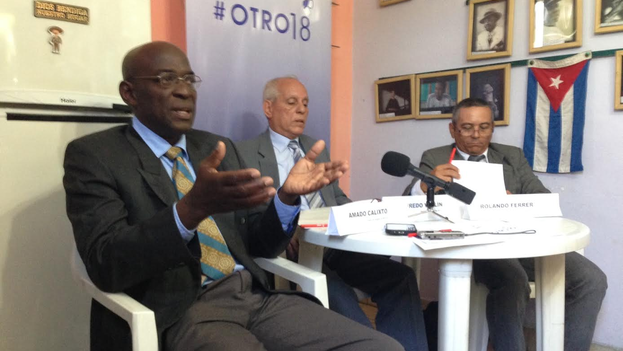
Rojas, 51, was taken to the Santiago de las Vegas police station and Valdés, 78, was taken to the Zapata and C Station and then to Aguilera, where police threatened to prosecute her legally.
The woman was released on Tuesday at about 10 at night, but there is still no information on the whereabouts of Rojas Rodriguez whose telephone continues to be out of service.continue reading
Manuel Cuesta Morúa, speaking on behalf of #Otro 18, told 14ymedio that “actions of this nature make clear the government’s intention to prevent the free participation of citizens in the next electoral process, thus opening the way to delegitimizing it.”
“The narrative of the government consists in classifying what we do as counterrevolutionary activities, but we have to assume that the law is not only for revolutionaries, but for all citizens and precisely because of this we are within the law,” he added.
The #Other18 initiative collects citizen proposals for new electoral laws, associations and political parties. In addition, at the moment it is focused on obtaining the nomination of independent candidates for the next elections for the People’s Power.
Police Raid Rafters’ Homes Looking for a Boat Stolen From the Army
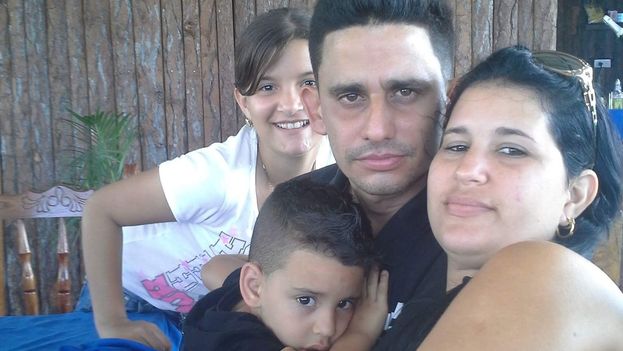
“I was resting next to my four-year-old boy when the neighbors called me and I discovered the officers who were searching my yard,” says Salazar by phone from San Miguel del Padrón in Havana.
“They came into the house and told me they were going to search everything because they were looking for an inflatable boat and that I and my husband were accomplices to the theft,” she adds. continue reading
José Yans Pérez Jomarrón, Salazar’s husband, has tried unsuccessfully to escape from Cuba six times, but has been intercepted by the Cuban Coast Guard or returned to the authorities of the island by its American counterparts. On his last voyage he took refuge, with some twenty Cubans, in a lighthouse 30 kilometers northeast of Key West.
José Yans Pérez Jomarrón, Salazar’s husband, has tried unsuccessfully to escape from Cuba six times, but has been intercepted by the Cuban or American Coast Guard and returned to the island
Although most of the rafters managed to be admitted a special program that gives them the opportunity to be relocated in a third country, because they were able to demonstrate “credible fear” of being persecuted in Cuba, for Pérez Jomarrón the outcome was different.
“When I finished my military service they offered me a job with the Ministry of the Interior (MININT). As an inexperienced boy I agreed and when the immigration agents in the United States learned that I had once belonged to that repressive organ, they returned me to Cuba,” explains the rafter-turned-entrepreneur who at the moment is in Guyana looking at the possibility of some business linked to his commercial activity.
Police and State Security agents accused Solayni Salazar of being an accomplice in the theft of the boat and described all the members of her family as antisocial and counterrevolutionary. “They offended me with their words as much as they wanted and when I threatened them with filing a complaint they were indifferent, because they know nothing is going to happen to them,” says the wife, age 31.
“They threatened to arrest me. But they never brought the witnesses (required by law) when they did the search and they never showed me a court order to enter my home. And they did all this in front of my little boy,” she says.
In addition, she says, she was told that her husband was in Guyana escaping from the law, an argument that Salazar considers “completely false.”
Salazar believes that the authorities are persecuting her family due to her husband’s multiple attempts to illegally exit the country and because of his opposition to the government
“I fear for what will happen to my husband when he returns from the trip. Surely they will try to arrest him or persecute him for a crime he has not committed,” she says.
Salazar believes that the authorities are persecuting her family due to her husband’s multiple attempts to illegally exit the country and because of his opposition to the government.
“They do not want to give me jobs in state institutions. It’s a way to persecute those who disagree with official politics,” says José Yans from Georgetown via telephone.
The situation is increasingly complex for the Cuban authorities. “Now not only do we have to pay for a ‘crime’ we didn’t commit but we are suspected of everything else that happens in the country.”
Alfredo Mena, a rafter who tried four times to leave the island, was also searched last Wednesday.
Alfredo Mena, a rafter who tried four times to leave the island, was also searched last Wednesday
“They came to my house and broke down the door without a search warrant. They took me to the police unit and accused me of having stolen a boat belonging to the FAR (National Revolutionary Police),” says Mena, nicknamed El Pelú, by the locals.
“The officers who were dealing with me asked me why we wanted to go to the United States, because there they killed people like us and another series of lies,” he adds.
Mena, 50, a native of Granma province, says he was threatened with being “deported” to the East, because he resides in Havana without having an address officially registered in the capital.
Mena was fined 2,000 pesos for the crime of “receiving” for buying supplies for his work as a welder. Although he swears he is innocent, those metal parts are an indispensable component in the manufacture of the makeshift boats used to emigrate.
“Nothing they took had anything to do with the supposed theft of the boat. The only thing they do with these things is to reaffirm one’s desire to escape from such garbage,” he adds.
A publication of the Institute for Cuban and Cuban-American Studies (ICCAS)
 | |||||||||||||||||||||
| |||||||||||||||||||||
| |||||||||||||||||||||
Thursday, April 27, 2017
3G Has Arrived In Havana

Prepaid users in the capital are now experiencing a substantial improvement in Nauta’s e-mail service on their mobile phone, a relief after three years since the creation of this product, which has been a frequent target of criticism and complaints about its instability and slowness.
“I opened my mailbox and: abracadabra! I got all the messages at once,” a young high school student tells 14ymedio in amazement while standing in line on Tuesday to buy recharge cards at the ETECSA office on the lower level of the Focsa building.
The days are long gone when only resident foreigners and tourists could contract for mobile phone service in Cuba. One of the first measures implemented by Raul Castro when he assumed the presidency in 2008 was to allow nationals to contract for prepaid cellphone service.
“Having the internet on your cellphone is normal for most people in the world, but here it seems like a dream“
Since then, more than four million customers of the state monopoly have been looking forward to connecting to the internet through their mobiles. Enabling 3G coverage has set off speculation about the imminent arrival of that service to cellphones.
“They can’t wait any longer, because having the internet on your cellphone is normal for most people in the world, but here it seems like a dream,” complains Rodobaldo, an industrial engineer, 42, who travels frequently to Panama. “As soon as I get there and install my Panamanian SIM card I can surf and receive emails, but when I return to Cuba my phone doesn’t have that capability.”
In Latin America, 3G has given way to 4G, which has been available for years. Uruguay has this network in 84% of its territory, Bolivia in 67%, Peru in 61% and Mexico in 60%, according to data from the International Telecommunication Union (ITU). However, in Cuba having this functionality on the mobile network still seems like a science fiction movie.
Rodobaldo is hopeful that ETECSA will soon offer packages to connect to the web from cell phones. Recently there was the first pilot project to bring internet to some 700 families (of the 2,000 initially planned) through in-home ADSL in Old Havana, but the users complain about the high prices: according to the bandwidth chosen it cost between 30 and 70 pesos for 30 hours.
“Every day there are more foreign companies offering packages so that tourists who come to the island can surf the internet from their own cellphone accounts,” an official of the state company, who preferred to remain anonymous,told this newspaper. “We have roaming agreements in more than 150 countries,” he says.
Following the beginning of the diplomatic thaw between Washington and Havana, announced on 17 December 2014, Barack Obama’s administration authorized US telecommunications companies to operate in Cuba.
Verizon took the first step and offered services to its users visiting the Island, and was later joined by Sprint, T-Mobile and AT&T. However, the prices of browsing from one of these phones during a stay in Cuba are still very high, averaging about $2.05 per megabyte.
Surfing the web from a US cellphone is possible in Cuba, but it runs about $2.05 per Megabyte
Until the implementation of 3G, roaming services sent and received emails via Nauta and text messages using the General Packet Radio Service (GPRS) connection, an enriched Global System for Mobile (GMS) communications.
Now, to be able to take advantage of 3G in Cuba, “the customer must have 3G coverage on their cellphone with the WCDMA standard on the 900 MHz frequency, which is the international standard in several European and Latin American countries,” Luis Manuel Díaz, ETECSA’s Director of Institutional Communications told the official press.
Phones that technically do not have the ability to access the new network will continue to use the 2G that “coexists without difficulty,” the company’s representative told the official newspaper Granma.
A marketing specialist for the state monopoly, Óscar López Díaz, goes further and in addition to highlighting the improvement in the connection speed for the use of the Nauta mail brought by 3G service, he believes that its arrival will enable ” future access to other services such as the Internet on phones.”
Subscribe to:
Posts (Atom)



